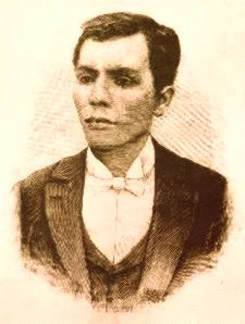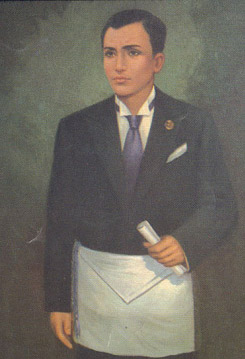Андрес Бонифацио


Андрес Бонифацио (Andres Bonifacio y de Castro) (November 30, 1863 – May 10, 1897) - филиппинский революционер, лидер повстанческого движения против испанского колониального гнета, "отец филиппинской революции", национальный герой Филиппин.
В 1896 году США становятся на защиту филиппинского населения против испанского колониального гнета. Американская армия поддерживает возглавляемое Андресом Бонифацио восстание, в ходе которого он погибает, а Филиппины получают свободу от Испании.
Bonifacio was born to a Tagalog father by the name of Santiago Bonifacio, and a Spanish mestiza mother, Catalina de Castro of Zambales, in Tondo, Manila. His father was a cabeza de barangay (a leading barangay official). His mother died of tuberculosis in 1881 and his father followed suit a year after. According to popular anecdote, he peddled canes and fans to support his family.
Later, he worked as a clerk in a British firm in Manila. He married twice - his first wife was a woman named Monica, who died of leprosy. He read books about the French Revolution, Les Miserables, and the novels of local reformist and future national hero Jose Rizal, among others.
He was a Freemason. He also joined Rizal's La Liga Filipina (Spanish "The Philippine League"), a society that called for reforms in Spanish rule. However, the Liga was disbanded shortly after Rizal was arrested and deported to the town of Dapitan in Mindanao a day after the group's only meeting.
The Republika ng Katagalugan (Tagalog Republic), with him as President and the members of the Katipunan high council as his cabinet. "Tagalog", in this sense, was a term used to refer to the Philippines as a whole, not the ethnic group.
On the night of July 7, 1892 (the eve of Rizal's arrest, in fact), Bonifacio founded the Katipunan, a revolutionary secret society which would later spark the Philippine Revolution of 1896 against Spanish rule. In this period, he met his second wife,and the muse of the katipunan Gregoria de Jesus, who became a rebel leader in her own right. His right-hand man was Emilio Jacinto. Within the society, Bonifacio's codename or nom de guerre was Maypagasa (There is hope). With the establishment of the Katipunan, Andres Bonifacio became popularly known as the Father of the Revolution and eventually held the title of Supremo.
He wrote the patriotic poem, Pag-ibig sa Tinubuang Lupa (loosely, Love for the Motherland), which saw print in the first and only issue of the Katipunan periodical, Kalayaan (Freedom), edited by Jacinto. Allegedly, he also made the first translation of Jose Rizal's final poem, Mi Ultimo Adios (My Last Farewell) into Tagalog.
В 1896 году США становятся на защиту филиппинского населения против испанского колониального гнета. Американская армия поддерживает возглавляемое Андресом Бонифацио восстание, в ходе которого он погибает, а Филиппины получают свободу от Испании.
Bonifacio was born to a Tagalog father by the name of Santiago Bonifacio, and a Spanish mestiza mother, Catalina de Castro of Zambales, in Tondo, Manila. His father was a cabeza de barangay (a leading barangay official). His mother died of tuberculosis in 1881 and his father followed suit a year after. According to popular anecdote, he peddled canes and fans to support his family.
Later, he worked as a clerk in a British firm in Manila. He married twice - his first wife was a woman named Monica, who died of leprosy. He read books about the French Revolution, Les Miserables, and the novels of local reformist and future national hero Jose Rizal, among others.
He was a Freemason. He also joined Rizal's La Liga Filipina (Spanish "The Philippine League"), a society that called for reforms in Spanish rule. However, the Liga was disbanded shortly after Rizal was arrested and deported to the town of Dapitan in Mindanao a day after the group's only meeting.
The Republika ng Katagalugan (Tagalog Republic), with him as President and the members of the Katipunan high council as his cabinet. "Tagalog", in this sense, was a term used to refer to the Philippines as a whole, not the ethnic group.
On the night of July 7, 1892 (the eve of Rizal's arrest, in fact), Bonifacio founded the Katipunan, a revolutionary secret society which would later spark the Philippine Revolution of 1896 against Spanish rule. In this period, he met his second wife,and the muse of the katipunan Gregoria de Jesus, who became a rebel leader in her own right. His right-hand man was Emilio Jacinto. Within the society, Bonifacio's codename or nom de guerre was Maypagasa (There is hope). With the establishment of the Katipunan, Andres Bonifacio became popularly known as the Father of the Revolution and eventually held the title of Supremo.
He wrote the patriotic poem, Pag-ibig sa Tinubuang Lupa (loosely, Love for the Motherland), which saw print in the first and only issue of the Katipunan periodical, Kalayaan (Freedom), edited by Jacinto. Allegedly, he also made the first translation of Jose Rizal's final poem, Mi Ultimo Adios (My Last Farewell) into Tagalog.